Nursing Assignment: Recovery Oriented Practice and Nursing Skills
VerifiedAdded on 2022/10/12
|11
|2542
|361
Essay
AI Summary
This nursing assignment delves into recovery-oriented practice, examining its historical roots and the evolution of mental health care. Task 1 explores the consumer movement's impact, the role of lived experiences and families, and the development of the recovery approach, highlighting the shift from traditional methods to patient-centered care. Task 2 focuses on specific nursing skills needed to meet the capabilities outlined in the framework, covering domains such as promoting hope, providing holistic care, empowering patients, organizational commitment, and fostering social inclusion. The assignment emphasizes the importance of nurses challenging stigma, advocating for patient rights, and utilizing assessment tools and collaborative approaches to support patients' personal recovery plans. It underscores the need for nurses to demonstrate organizational commitment, continuous learning, and effective communication to create an inclusive environment and provide equitable access to care for individuals with mental health disorders.
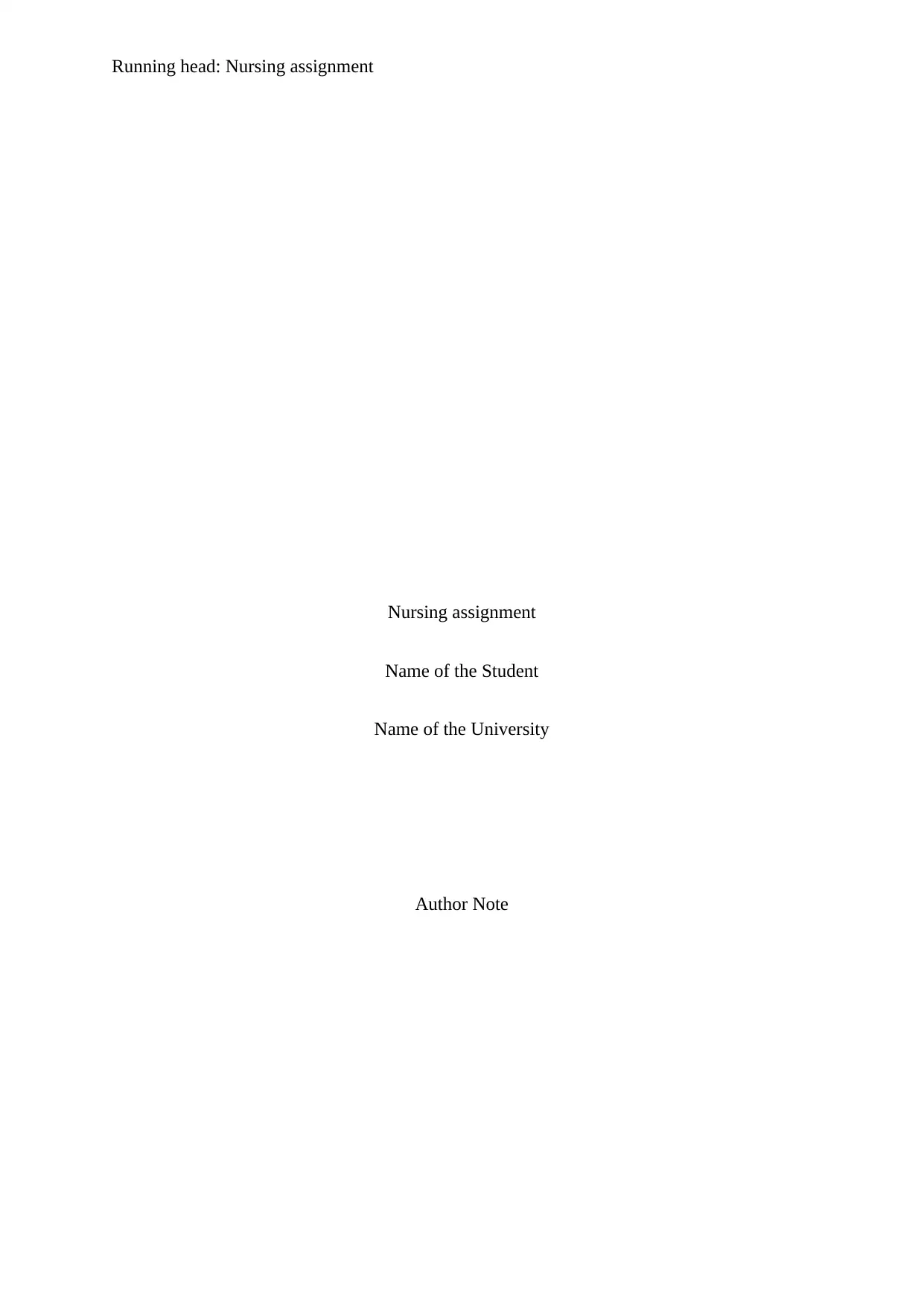
Running head: Nursing assignment
Nursing assignment
Name of the Student
Name of the University
Author Note
Nursing assignment
Name of the Student
Name of the University
Author Note
Paraphrase This Document
Need a fresh take? Get an instant paraphrase of this document with our AI Paraphraser
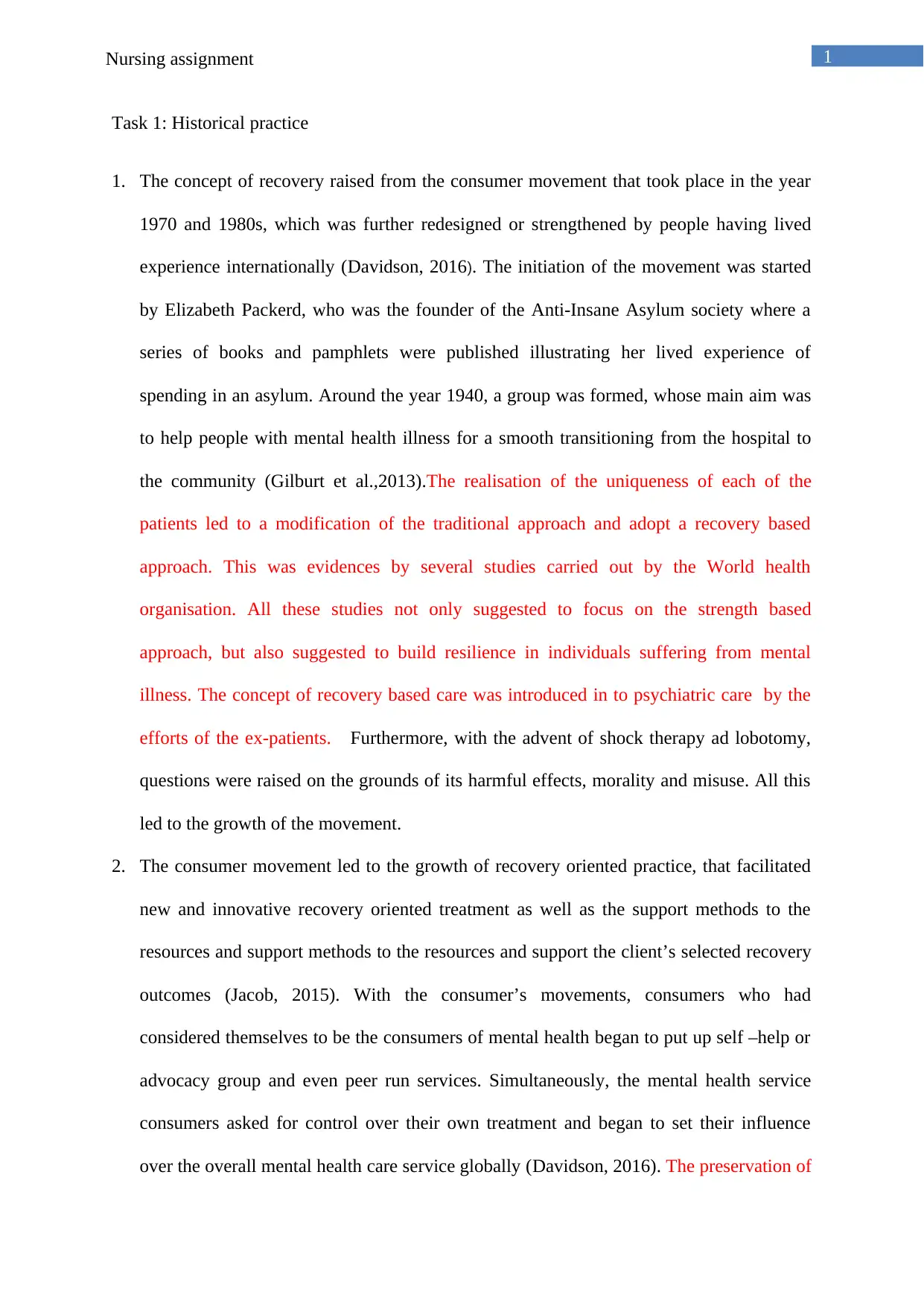
1Nursing assignment
Task 1: Historical practice
1. The concept of recovery raised from the consumer movement that took place in the year
1970 and 1980s, which was further redesigned or strengthened by people having lived
experience internationally (Davidson, 2016). The initiation of the movement was started
by Elizabeth Packerd, who was the founder of the Anti-Insane Asylum society where a
series of books and pamphlets were published illustrating her lived experience of
spending in an asylum. Around the year 1940, a group was formed, whose main aim was
to help people with mental health illness for a smooth transitioning from the hospital to
the community (Gilburt et al.,2013).The realisation of the uniqueness of each of the
patients led to a modification of the traditional approach and adopt a recovery based
approach. This was evidences by several studies carried out by the World health
organisation. All these studies not only suggested to focus on the strength based
approach, but also suggested to build resilience in individuals suffering from mental
illness. The concept of recovery based care was introduced in to psychiatric care by the
efforts of the ex-patients. Furthermore, with the advent of shock therapy ad lobotomy,
questions were raised on the grounds of its harmful effects, morality and misuse. All this
led to the growth of the movement.
2. The consumer movement led to the growth of recovery oriented practice, that facilitated
new and innovative recovery oriented treatment as well as the support methods to the
resources and support methods to the resources and support the client’s selected recovery
outcomes (Jacob, 2015). With the consumer’s movements, consumers who had
considered themselves to be the consumers of mental health began to put up self –help or
advocacy group and even peer run services. Simultaneously, the mental health service
consumers asked for control over their own treatment and began to set their influence
over the overall mental health care service globally (Davidson, 2016). The preservation of
Task 1: Historical practice
1. The concept of recovery raised from the consumer movement that took place in the year
1970 and 1980s, which was further redesigned or strengthened by people having lived
experience internationally (Davidson, 2016). The initiation of the movement was started
by Elizabeth Packerd, who was the founder of the Anti-Insane Asylum society where a
series of books and pamphlets were published illustrating her lived experience of
spending in an asylum. Around the year 1940, a group was formed, whose main aim was
to help people with mental health illness for a smooth transitioning from the hospital to
the community (Gilburt et al.,2013).The realisation of the uniqueness of each of the
patients led to a modification of the traditional approach and adopt a recovery based
approach. This was evidences by several studies carried out by the World health
organisation. All these studies not only suggested to focus on the strength based
approach, but also suggested to build resilience in individuals suffering from mental
illness. The concept of recovery based care was introduced in to psychiatric care by the
efforts of the ex-patients. Furthermore, with the advent of shock therapy ad lobotomy,
questions were raised on the grounds of its harmful effects, morality and misuse. All this
led to the growth of the movement.
2. The consumer movement led to the growth of recovery oriented practice, that facilitated
new and innovative recovery oriented treatment as well as the support methods to the
resources and support methods to the resources and support the client’s selected recovery
outcomes (Jacob, 2015). With the consumer’s movements, consumers who had
considered themselves to be the consumers of mental health began to put up self –help or
advocacy group and even peer run services. Simultaneously, the mental health service
consumers asked for control over their own treatment and began to set their influence
over the overall mental health care service globally (Davidson, 2016). The preservation of
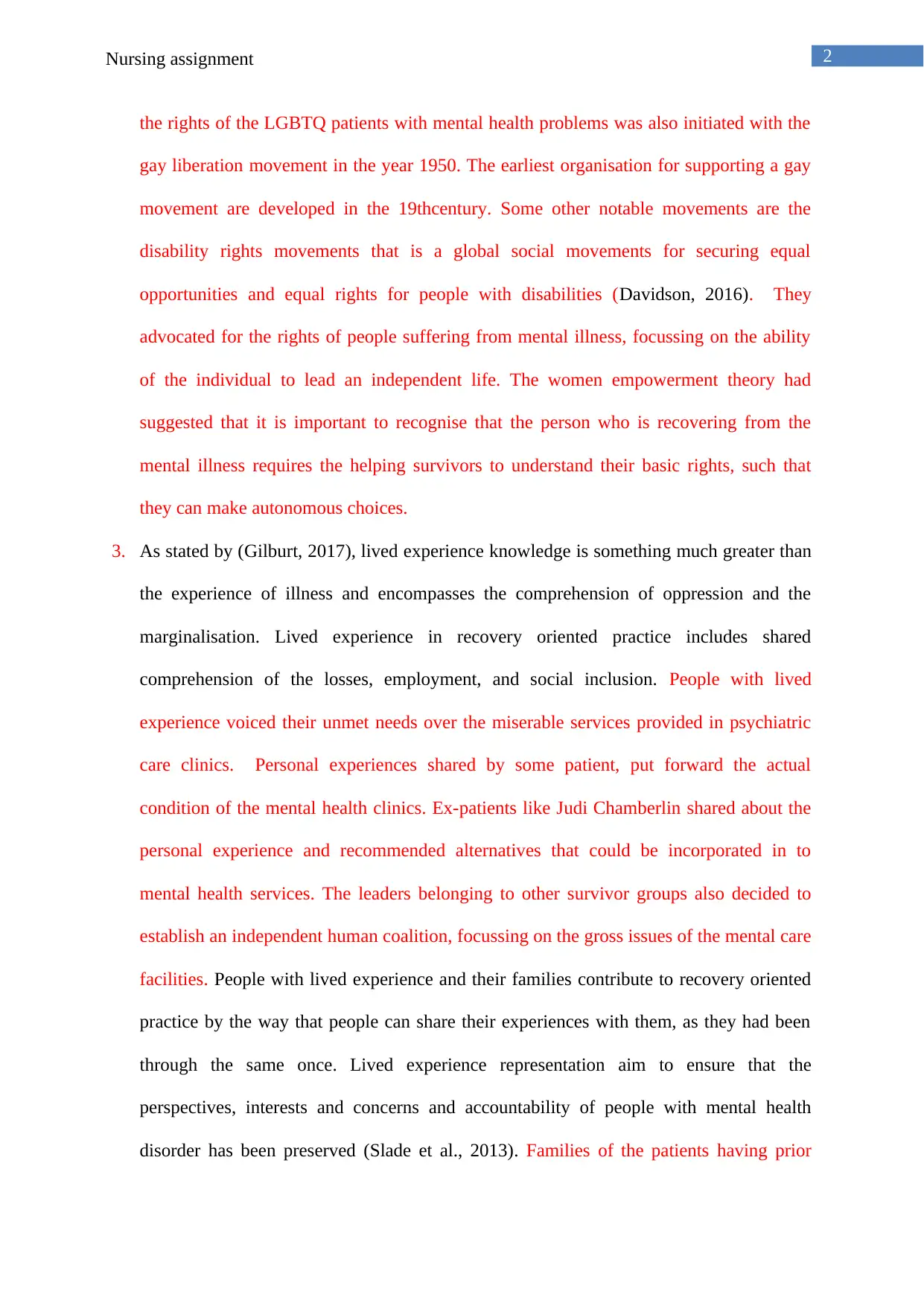
2Nursing assignment
the rights of the LGBTQ patients with mental health problems was also initiated with the
gay liberation movement in the year 1950. The earliest organisation for supporting a gay
movement are developed in the 19thcentury. Some other notable movements are the
disability rights movements that is a global social movements for securing equal
opportunities and equal rights for people with disabilities (Davidson, 2016). They
advocated for the rights of people suffering from mental illness, focussing on the ability
of the individual to lead an independent life. The women empowerment theory had
suggested that it is important to recognise that the person who is recovering from the
mental illness requires the helping survivors to understand their basic rights, such that
they can make autonomous choices.
3. As stated by (Gilburt, 2017), lived experience knowledge is something much greater than
the experience of illness and encompasses the comprehension of oppression and the
marginalisation. Lived experience in recovery oriented practice includes shared
comprehension of the losses, employment, and social inclusion. People with lived
experience voiced their unmet needs over the miserable services provided in psychiatric
care clinics. Personal experiences shared by some patient, put forward the actual
condition of the mental health clinics. Ex-patients like Judi Chamberlin shared about the
personal experience and recommended alternatives that could be incorporated in to
mental health services. The leaders belonging to other survivor groups also decided to
establish an independent human coalition, focussing on the gross issues of the mental care
facilities. People with lived experience and their families contribute to recovery oriented
practice by the way that people can share their experiences with them, as they had been
through the same once. Lived experience representation aim to ensure that the
perspectives, interests and concerns and accountability of people with mental health
disorder has been preserved (Slade et al., 2013). Families of the patients having prior
the rights of the LGBTQ patients with mental health problems was also initiated with the
gay liberation movement in the year 1950. The earliest organisation for supporting a gay
movement are developed in the 19thcentury. Some other notable movements are the
disability rights movements that is a global social movements for securing equal
opportunities and equal rights for people with disabilities (Davidson, 2016). They
advocated for the rights of people suffering from mental illness, focussing on the ability
of the individual to lead an independent life. The women empowerment theory had
suggested that it is important to recognise that the person who is recovering from the
mental illness requires the helping survivors to understand their basic rights, such that
they can make autonomous choices.
3. As stated by (Gilburt, 2017), lived experience knowledge is something much greater than
the experience of illness and encompasses the comprehension of oppression and the
marginalisation. Lived experience in recovery oriented practice includes shared
comprehension of the losses, employment, and social inclusion. People with lived
experience voiced their unmet needs over the miserable services provided in psychiatric
care clinics. Personal experiences shared by some patient, put forward the actual
condition of the mental health clinics. Ex-patients like Judi Chamberlin shared about the
personal experience and recommended alternatives that could be incorporated in to
mental health services. The leaders belonging to other survivor groups also decided to
establish an independent human coalition, focussing on the gross issues of the mental care
facilities. People with lived experience and their families contribute to recovery oriented
practice by the way that people can share their experiences with them, as they had been
through the same once. Lived experience representation aim to ensure that the
perspectives, interests and concerns and accountability of people with mental health
disorder has been preserved (Slade et al., 2013). Families of the patients having prior
⊘ This is a preview!⊘
Do you want full access?
Subscribe today to unlock all pages.

Trusted by 1+ million students worldwide
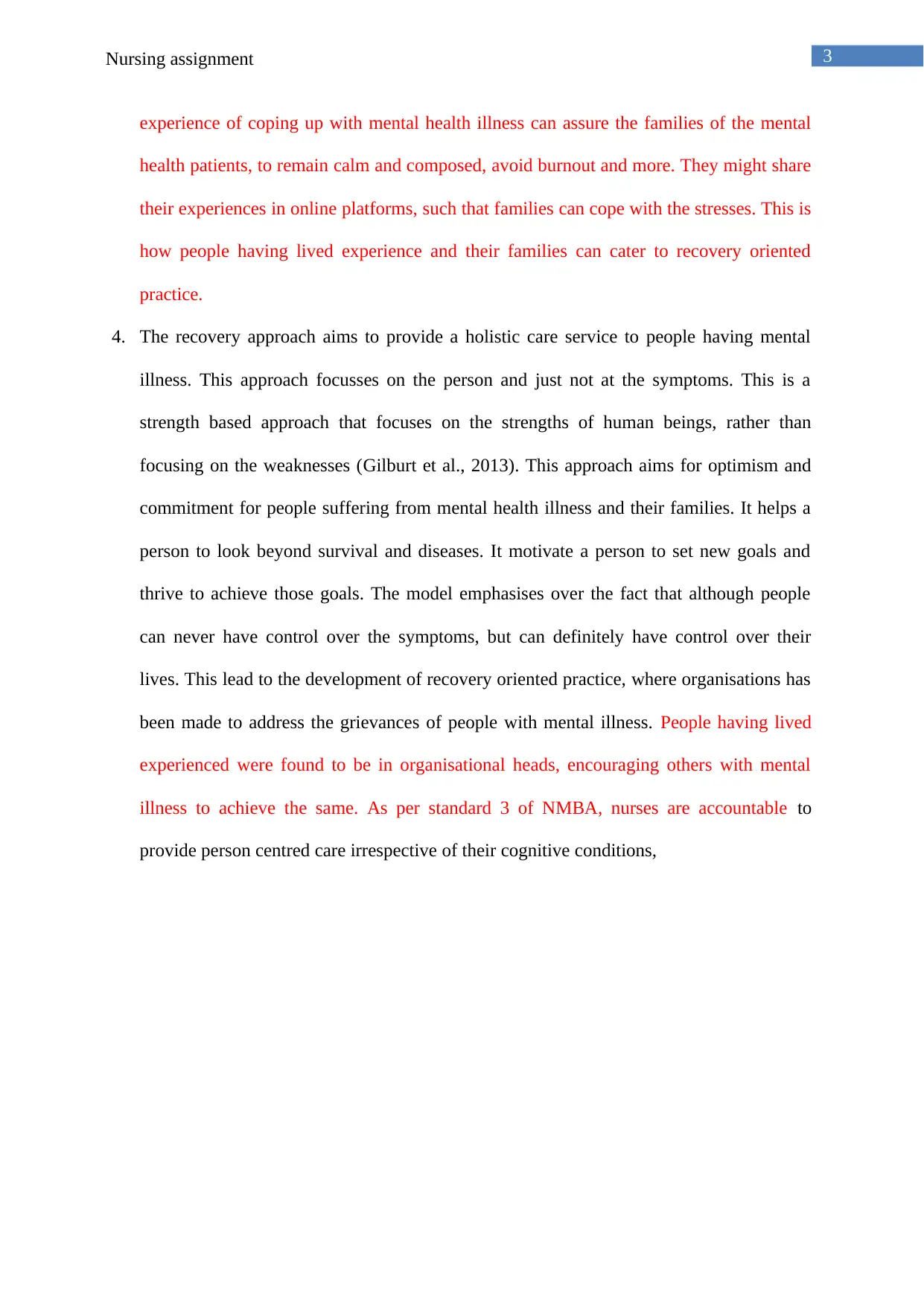
3Nursing assignment
experience of coping up with mental health illness can assure the families of the mental
health patients, to remain calm and composed, avoid burnout and more. They might share
their experiences in online platforms, such that families can cope with the stresses. This is
how people having lived experience and their families can cater to recovery oriented
practice.
4. The recovery approach aims to provide a holistic care service to people having mental
illness. This approach focusses on the person and just not at the symptoms. This is a
strength based approach that focuses on the strengths of human beings, rather than
focusing on the weaknesses (Gilburt et al., 2013). This approach aims for optimism and
commitment for people suffering from mental health illness and their families. It helps a
person to look beyond survival and diseases. It motivate a person to set new goals and
thrive to achieve those goals. The model emphasises over the fact that although people
can never have control over the symptoms, but can definitely have control over their
lives. This lead to the development of recovery oriented practice, where organisations has
been made to address the grievances of people with mental illness. People having lived
experienced were found to be in organisational heads, encouraging others with mental
illness to achieve the same. As per standard 3 of NMBA, nurses are accountable to
provide person centred care irrespective of their cognitive conditions,
experience of coping up with mental health illness can assure the families of the mental
health patients, to remain calm and composed, avoid burnout and more. They might share
their experiences in online platforms, such that families can cope with the stresses. This is
how people having lived experience and their families can cater to recovery oriented
practice.
4. The recovery approach aims to provide a holistic care service to people having mental
illness. This approach focusses on the person and just not at the symptoms. This is a
strength based approach that focuses on the strengths of human beings, rather than
focusing on the weaknesses (Gilburt et al., 2013). This approach aims for optimism and
commitment for people suffering from mental health illness and their families. It helps a
person to look beyond survival and diseases. It motivate a person to set new goals and
thrive to achieve those goals. The model emphasises over the fact that although people
can never have control over the symptoms, but can definitely have control over their
lives. This lead to the development of recovery oriented practice, where organisations has
been made to address the grievances of people with mental illness. People having lived
experienced were found to be in organisational heads, encouraging others with mental
illness to achieve the same. As per standard 3 of NMBA, nurses are accountable to
provide person centred care irrespective of their cognitive conditions,
Paraphrase This Document
Need a fresh take? Get an instant paraphrase of this document with our AI Paraphraser
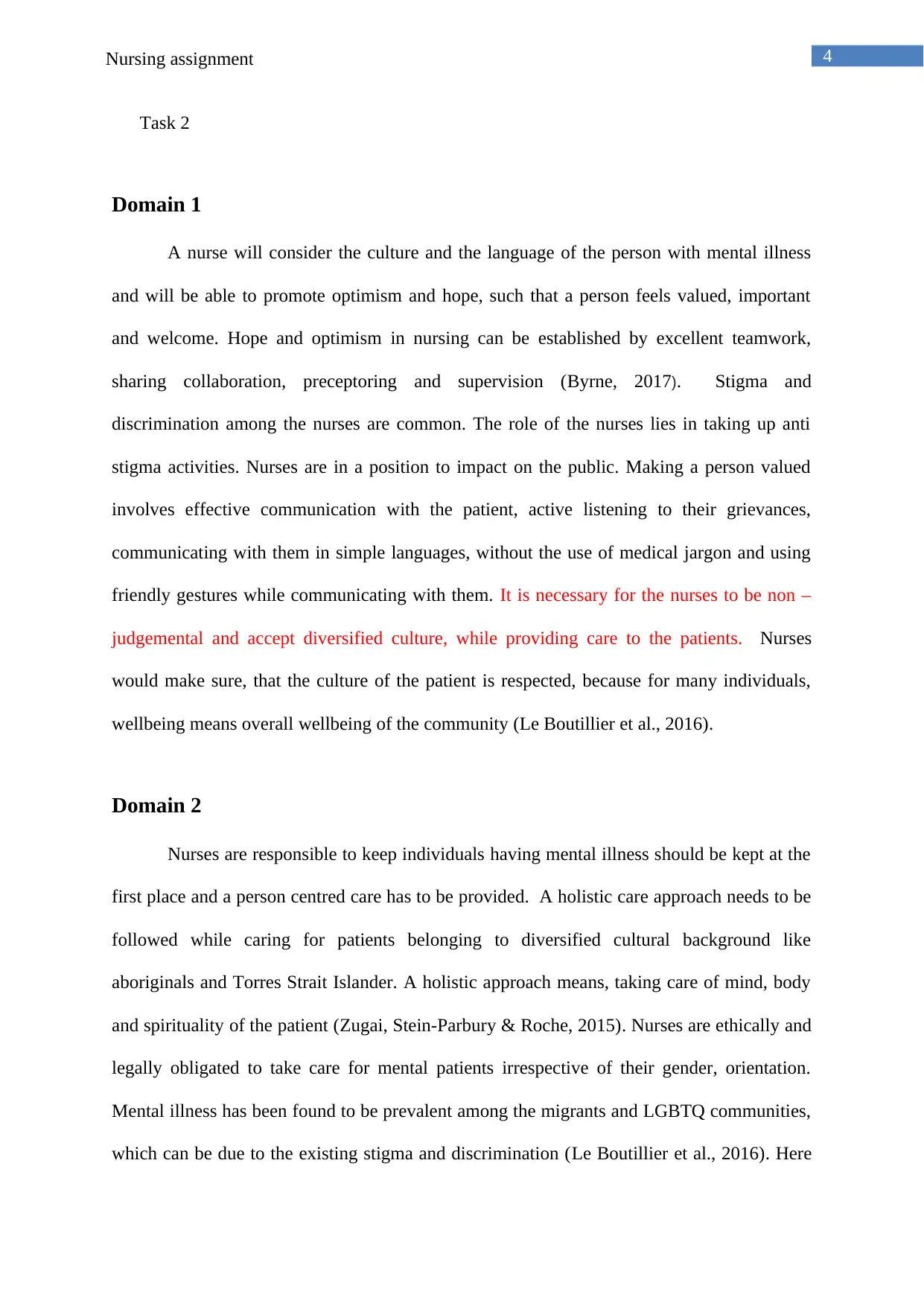
4Nursing assignment
Task 2
Domain 1
A nurse will consider the culture and the language of the person with mental illness
and will be able to promote optimism and hope, such that a person feels valued, important
and welcome. Hope and optimism in nursing can be established by excellent teamwork,
sharing collaboration, preceptoring and supervision (Byrne, 2017). Stigma and
discrimination among the nurses are common. The role of the nurses lies in taking up anti
stigma activities. Nurses are in a position to impact on the public. Making a person valued
involves effective communication with the patient, active listening to their grievances,
communicating with them in simple languages, without the use of medical jargon and using
friendly gestures while communicating with them. It is necessary for the nurses to be non –
judgemental and accept diversified culture, while providing care to the patients. Nurses
would make sure, that the culture of the patient is respected, because for many individuals,
wellbeing means overall wellbeing of the community (Le Boutillier et al., 2016).
Domain 2
Nurses are responsible to keep individuals having mental illness should be kept at the
first place and a person centred care has to be provided. A holistic care approach needs to be
followed while caring for patients belonging to diversified cultural background like
aboriginals and Torres Strait Islander. A holistic approach means, taking care of mind, body
and spirituality of the patient (Zugai, Stein-Parbury & Roche, 2015). Nurses are ethically and
legally obligated to take care for mental patients irrespective of their gender, orientation.
Mental illness has been found to be prevalent among the migrants and LGBTQ communities,
which can be due to the existing stigma and discrimination (Le Boutillier et al., 2016). Here
Task 2
Domain 1
A nurse will consider the culture and the language of the person with mental illness
and will be able to promote optimism and hope, such that a person feels valued, important
and welcome. Hope and optimism in nursing can be established by excellent teamwork,
sharing collaboration, preceptoring and supervision (Byrne, 2017). Stigma and
discrimination among the nurses are common. The role of the nurses lies in taking up anti
stigma activities. Nurses are in a position to impact on the public. Making a person valued
involves effective communication with the patient, active listening to their grievances,
communicating with them in simple languages, without the use of medical jargon and using
friendly gestures while communicating with them. It is necessary for the nurses to be non –
judgemental and accept diversified culture, while providing care to the patients. Nurses
would make sure, that the culture of the patient is respected, because for many individuals,
wellbeing means overall wellbeing of the community (Le Boutillier et al., 2016).
Domain 2
Nurses are responsible to keep individuals having mental illness should be kept at the
first place and a person centred care has to be provided. A holistic care approach needs to be
followed while caring for patients belonging to diversified cultural background like
aboriginals and Torres Strait Islander. A holistic approach means, taking care of mind, body
and spirituality of the patient (Zugai, Stein-Parbury & Roche, 2015). Nurses are ethically and
legally obligated to take care for mental patients irrespective of their gender, orientation.
Mental illness has been found to be prevalent among the migrants and LGBTQ communities,
which can be due to the existing stigma and discrimination (Le Boutillier et al., 2016). Here
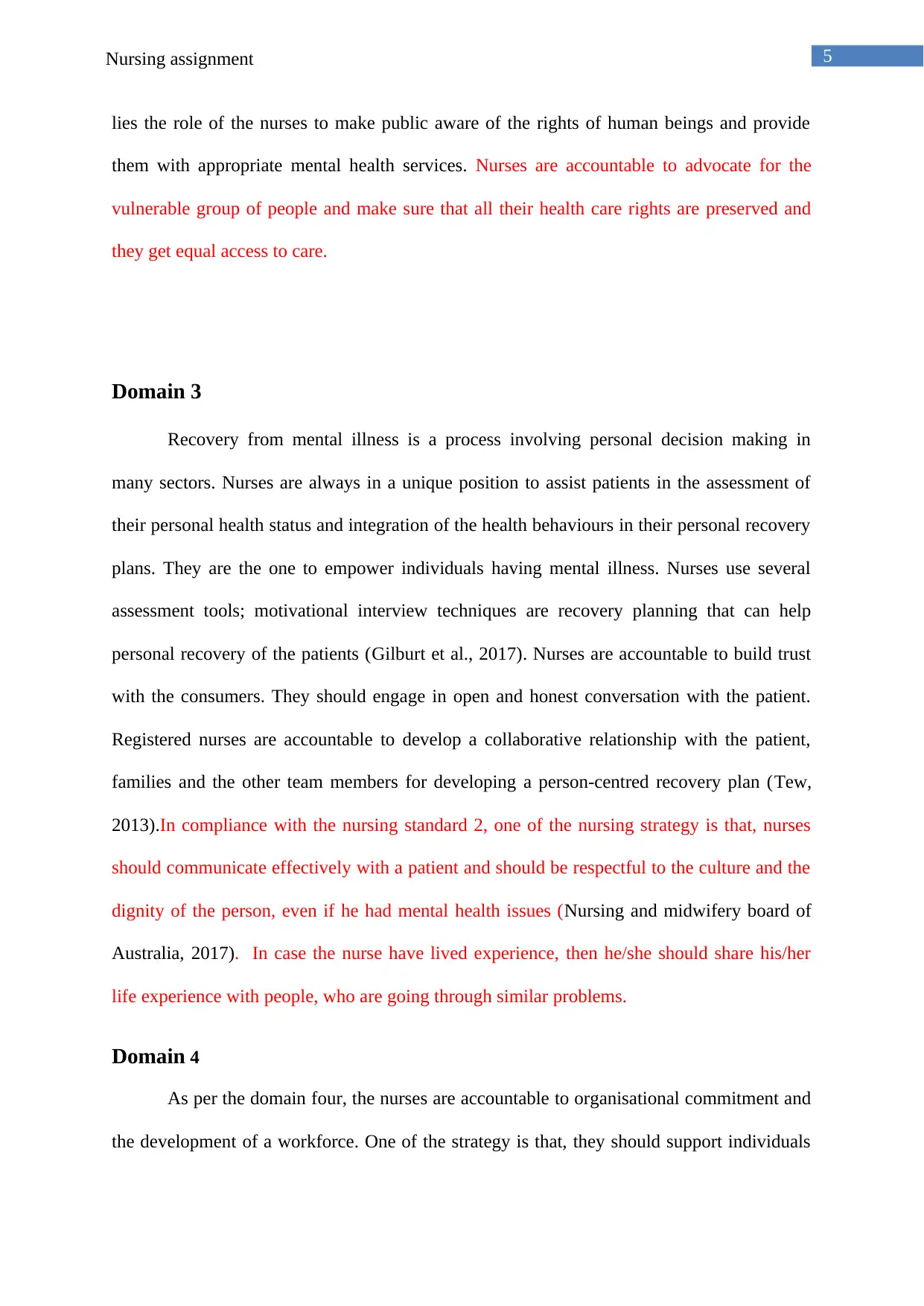
5Nursing assignment
lies the role of the nurses to make public aware of the rights of human beings and provide
them with appropriate mental health services. Nurses are accountable to advocate for the
vulnerable group of people and make sure that all their health care rights are preserved and
they get equal access to care.
Domain 3
Recovery from mental illness is a process involving personal decision making in
many sectors. Nurses are always in a unique position to assist patients in the assessment of
their personal health status and integration of the health behaviours in their personal recovery
plans. They are the one to empower individuals having mental illness. Nurses use several
assessment tools; motivational interview techniques are recovery planning that can help
personal recovery of the patients (Gilburt et al., 2017). Nurses are accountable to build trust
with the consumers. They should engage in open and honest conversation with the patient.
Registered nurses are accountable to develop a collaborative relationship with the patient,
families and the other team members for developing a person-centred recovery plan (Tew,
2013).In compliance with the nursing standard 2, one of the nursing strategy is that, nurses
should communicate effectively with a patient and should be respectful to the culture and the
dignity of the person, even if he had mental health issues (Nursing and midwifery board of
Australia, 2017). In case the nurse have lived experience, then he/she should share his/her
life experience with people, who are going through similar problems.
Domain 4
As per the domain four, the nurses are accountable to organisational commitment and
the development of a workforce. One of the strategy is that, they should support individuals
lies the role of the nurses to make public aware of the rights of human beings and provide
them with appropriate mental health services. Nurses are accountable to advocate for the
vulnerable group of people and make sure that all their health care rights are preserved and
they get equal access to care.
Domain 3
Recovery from mental illness is a process involving personal decision making in
many sectors. Nurses are always in a unique position to assist patients in the assessment of
their personal health status and integration of the health behaviours in their personal recovery
plans. They are the one to empower individuals having mental illness. Nurses use several
assessment tools; motivational interview techniques are recovery planning that can help
personal recovery of the patients (Gilburt et al., 2017). Nurses are accountable to build trust
with the consumers. They should engage in open and honest conversation with the patient.
Registered nurses are accountable to develop a collaborative relationship with the patient,
families and the other team members for developing a person-centred recovery plan (Tew,
2013).In compliance with the nursing standard 2, one of the nursing strategy is that, nurses
should communicate effectively with a patient and should be respectful to the culture and the
dignity of the person, even if he had mental health issues (Nursing and midwifery board of
Australia, 2017). In case the nurse have lived experience, then he/she should share his/her
life experience with people, who are going through similar problems.
Domain 4
As per the domain four, the nurses are accountable to organisational commitment and
the development of a workforce. One of the strategy is that, they should support individuals
⊘ This is a preview!⊘
Do you want full access?
Subscribe today to unlock all pages.

Trusted by 1+ million students worldwide
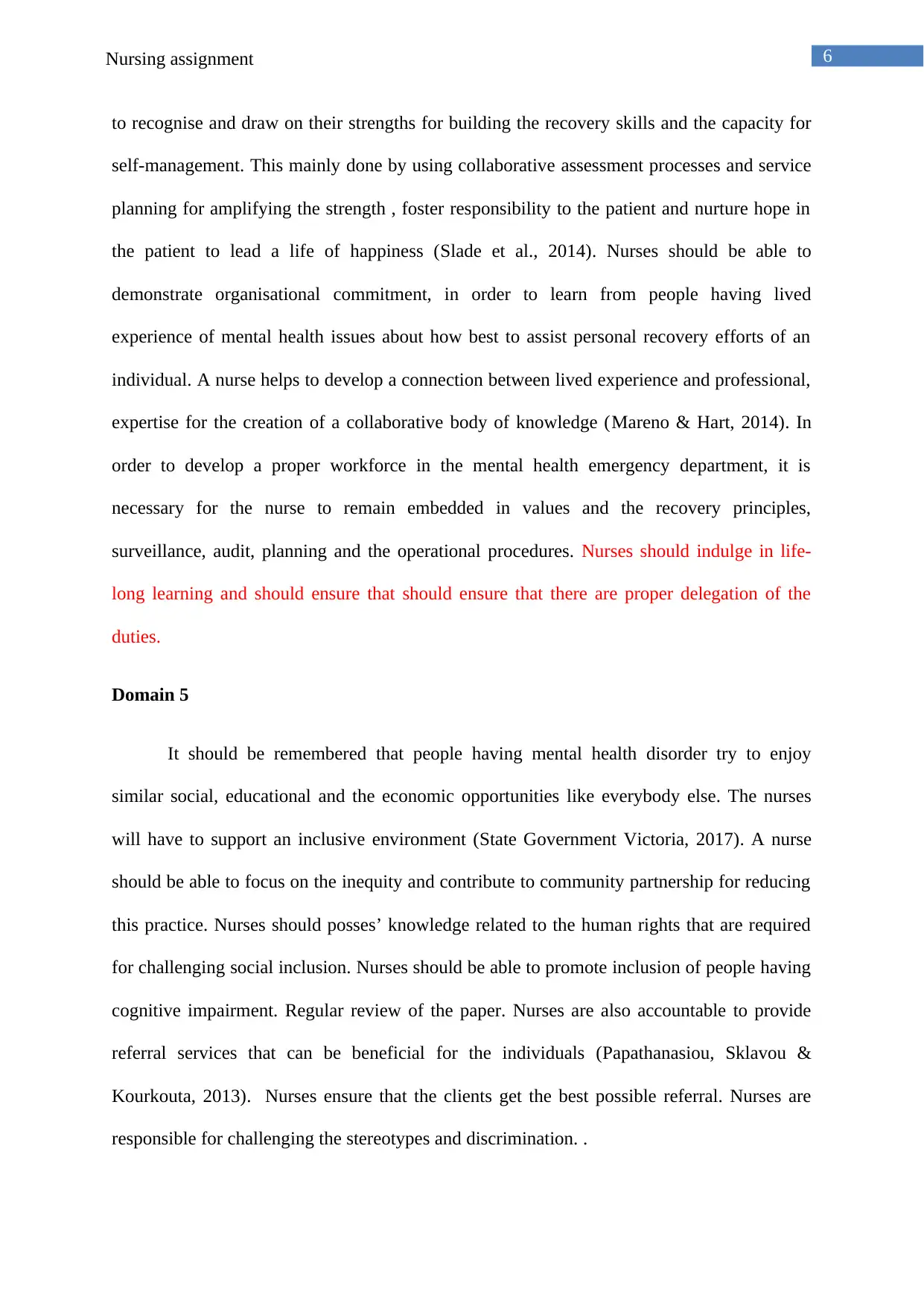
6Nursing assignment
to recognise and draw on their strengths for building the recovery skills and the capacity for
self-management. This mainly done by using collaborative assessment processes and service
planning for amplifying the strength , foster responsibility to the patient and nurture hope in
the patient to lead a life of happiness (Slade et al., 2014). Nurses should be able to
demonstrate organisational commitment, in order to learn from people having lived
experience of mental health issues about how best to assist personal recovery efforts of an
individual. A nurse helps to develop a connection between lived experience and professional,
expertise for the creation of a collaborative body of knowledge (Mareno & Hart, 2014). In
order to develop a proper workforce in the mental health emergency department, it is
necessary for the nurse to remain embedded in values and the recovery principles,
surveillance, audit, planning and the operational procedures. Nurses should indulge in life-
long learning and should ensure that should ensure that there are proper delegation of the
duties.
Domain 5
It should be remembered that people having mental health disorder try to enjoy
similar social, educational and the economic opportunities like everybody else. The nurses
will have to support an inclusive environment (State Government Victoria, 2017). A nurse
should be able to focus on the inequity and contribute to community partnership for reducing
this practice. Nurses should posses’ knowledge related to the human rights that are required
for challenging social inclusion. Nurses should be able to promote inclusion of people having
cognitive impairment. Regular review of the paper. Nurses are also accountable to provide
referral services that can be beneficial for the individuals (Papathanasiou, Sklavou &
Kourkouta, 2013). Nurses ensure that the clients get the best possible referral. Nurses are
responsible for challenging the stereotypes and discrimination. .
to recognise and draw on their strengths for building the recovery skills and the capacity for
self-management. This mainly done by using collaborative assessment processes and service
planning for amplifying the strength , foster responsibility to the patient and nurture hope in
the patient to lead a life of happiness (Slade et al., 2014). Nurses should be able to
demonstrate organisational commitment, in order to learn from people having lived
experience of mental health issues about how best to assist personal recovery efforts of an
individual. A nurse helps to develop a connection between lived experience and professional,
expertise for the creation of a collaborative body of knowledge (Mareno & Hart, 2014). In
order to develop a proper workforce in the mental health emergency department, it is
necessary for the nurse to remain embedded in values and the recovery principles,
surveillance, audit, planning and the operational procedures. Nurses should indulge in life-
long learning and should ensure that should ensure that there are proper delegation of the
duties.
Domain 5
It should be remembered that people having mental health disorder try to enjoy
similar social, educational and the economic opportunities like everybody else. The nurses
will have to support an inclusive environment (State Government Victoria, 2017). A nurse
should be able to focus on the inequity and contribute to community partnership for reducing
this practice. Nurses should posses’ knowledge related to the human rights that are required
for challenging social inclusion. Nurses should be able to promote inclusion of people having
cognitive impairment. Regular review of the paper. Nurses are also accountable to provide
referral services that can be beneficial for the individuals (Papathanasiou, Sklavou &
Kourkouta, 2013). Nurses ensure that the clients get the best possible referral. Nurses are
responsible for challenging the stereotypes and discrimination. .
Paraphrase This Document
Need a fresh take? Get an instant paraphrase of this document with our AI Paraphraser

7Nursing assignment
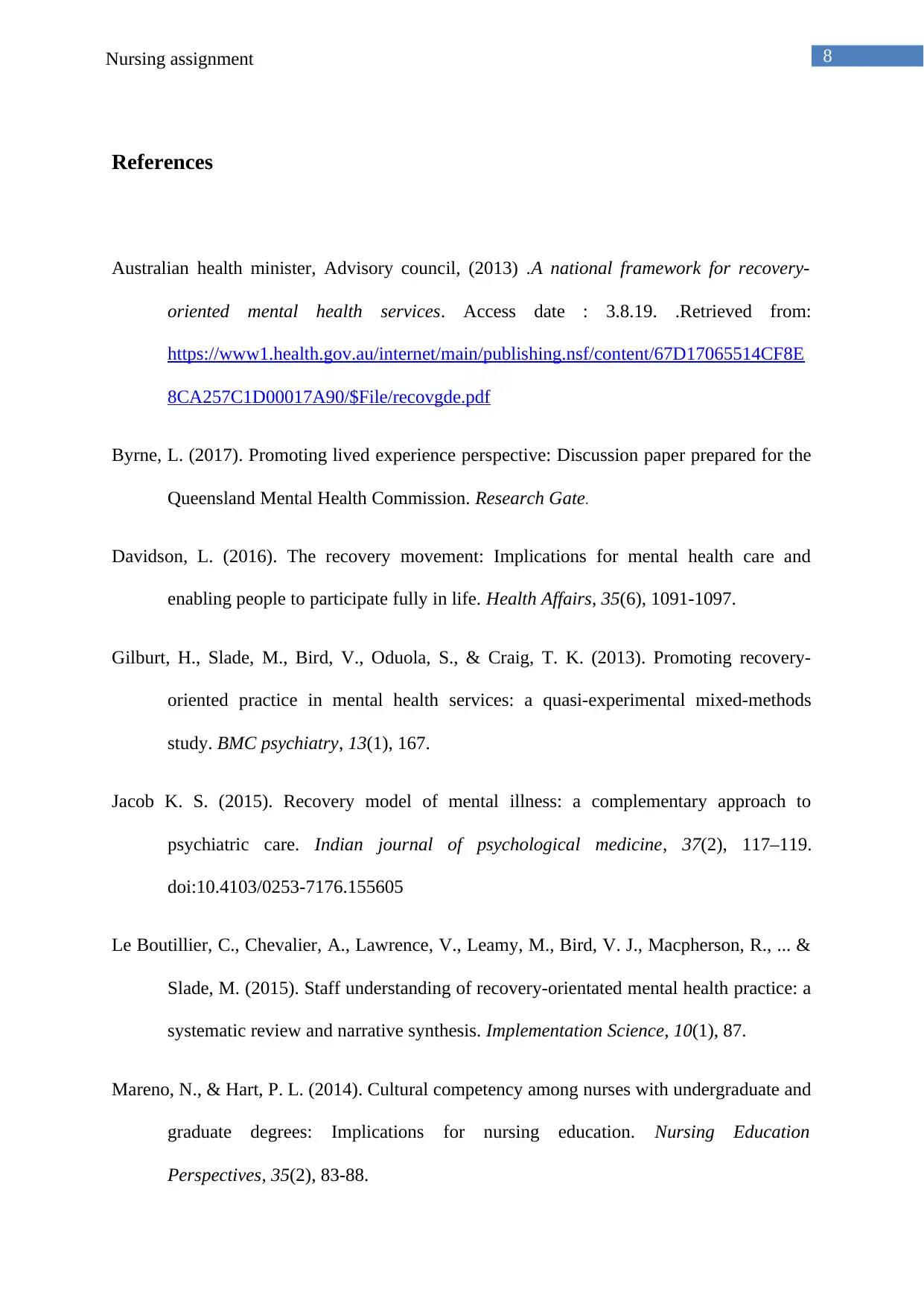
8Nursing assignment
References
Australian health minister, Advisory council, (2013) .A national framework for recovery-
oriented mental health services. Access date : 3.8.19. .Retrieved from:
https://www1.health.gov.au/internet/main/publishing.nsf/content/67D17065514CF8E
8CA257C1D00017A90/$File/recovgde.pdf
Byrne, L. (2017). Promoting lived experience perspective: Discussion paper prepared for the
Queensland Mental Health Commission. Research Gate.
Davidson, L. (2016). The recovery movement: Implications for mental health care and
enabling people to participate fully in life. Health Affairs, 35(6), 1091-1097.
Gilburt, H., Slade, M., Bird, V., Oduola, S., & Craig, T. K. (2013). Promoting recovery-
oriented practice in mental health services: a quasi-experimental mixed-methods
study. BMC psychiatry, 13(1), 167.
Jacob K. S. (2015). Recovery model of mental illness: a complementary approach to
psychiatric care. Indian journal of psychological medicine, 37(2), 117–119.
doi:10.4103/0253-7176.155605
Le Boutillier, C., Chevalier, A., Lawrence, V., Leamy, M., Bird, V. J., Macpherson, R., ... &
Slade, M. (2015). Staff understanding of recovery-orientated mental health practice: a
systematic review and narrative synthesis. Implementation Science, 10(1), 87.
Mareno, N., & Hart, P. L. (2014). Cultural competency among nurses with undergraduate and
graduate degrees: Implications for nursing education. Nursing Education
Perspectives, 35(2), 83-88.
References
Australian health minister, Advisory council, (2013) .A national framework for recovery-
oriented mental health services. Access date : 3.8.19. .Retrieved from:
https://www1.health.gov.au/internet/main/publishing.nsf/content/67D17065514CF8E
8CA257C1D00017A90/$File/recovgde.pdf
Byrne, L. (2017). Promoting lived experience perspective: Discussion paper prepared for the
Queensland Mental Health Commission. Research Gate.
Davidson, L. (2016). The recovery movement: Implications for mental health care and
enabling people to participate fully in life. Health Affairs, 35(6), 1091-1097.
Gilburt, H., Slade, M., Bird, V., Oduola, S., & Craig, T. K. (2013). Promoting recovery-
oriented practice in mental health services: a quasi-experimental mixed-methods
study. BMC psychiatry, 13(1), 167.
Jacob K. S. (2015). Recovery model of mental illness: a complementary approach to
psychiatric care. Indian journal of psychological medicine, 37(2), 117–119.
doi:10.4103/0253-7176.155605
Le Boutillier, C., Chevalier, A., Lawrence, V., Leamy, M., Bird, V. J., Macpherson, R., ... &
Slade, M. (2015). Staff understanding of recovery-orientated mental health practice: a
systematic review and narrative synthesis. Implementation Science, 10(1), 87.
Mareno, N., & Hart, P. L. (2014). Cultural competency among nurses with undergraduate and
graduate degrees: Implications for nursing education. Nursing Education
Perspectives, 35(2), 83-88.
⊘ This is a preview!⊘
Do you want full access?
Subscribe today to unlock all pages.

Trusted by 1+ million students worldwide
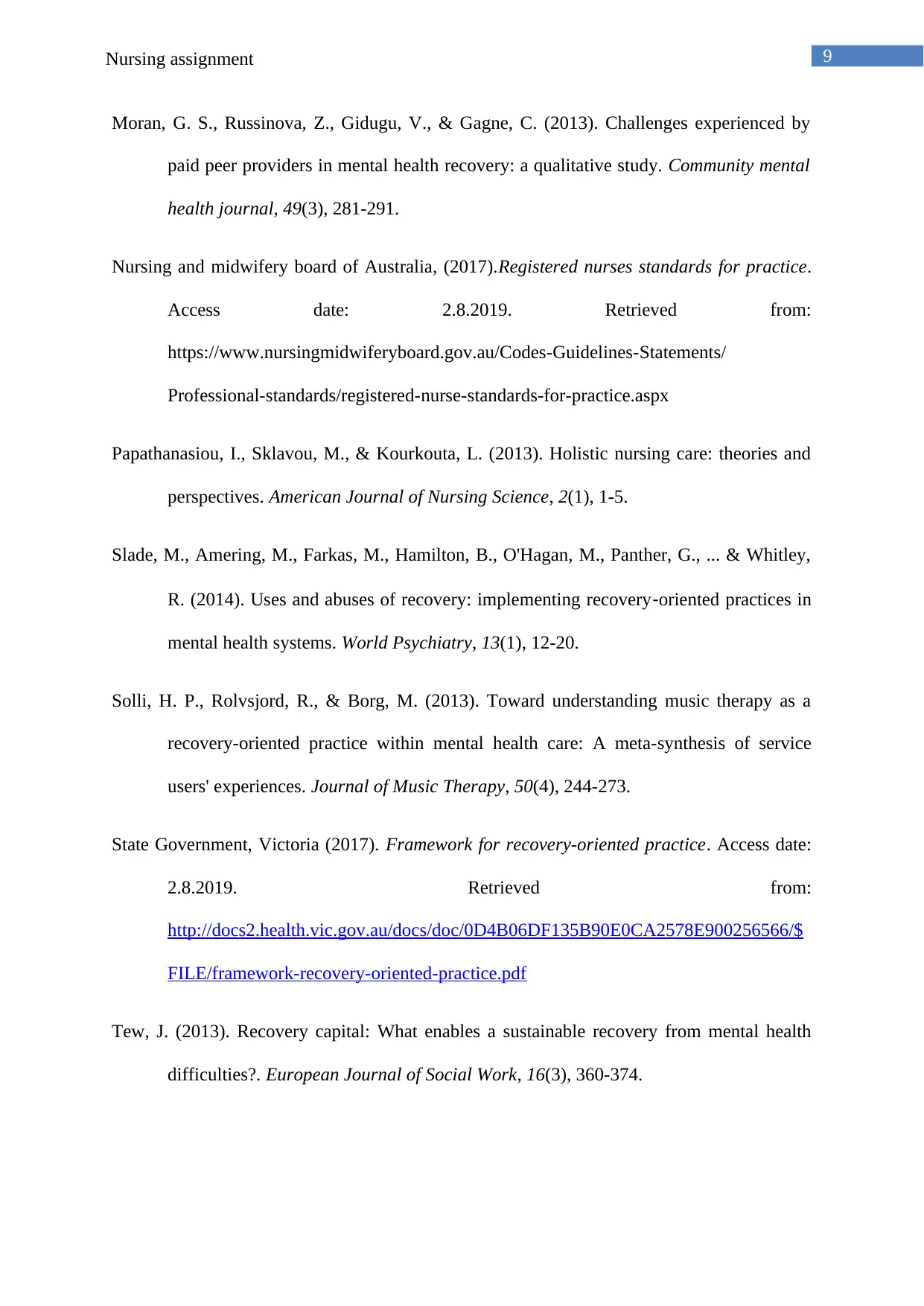
9Nursing assignment
Moran, G. S., Russinova, Z., Gidugu, V., & Gagne, C. (2013). Challenges experienced by
paid peer providers in mental health recovery: a qualitative study. Community mental
health journal, 49(3), 281-291.
Nursing and midwifery board of Australia, (2017).Registered nurses standards for practice.
Access date: 2.8.2019. Retrieved from:
https://www.nursingmidwiferyboard.gov.au/Codes-Guidelines-Statements/
Professional-standards/registered-nurse-standards-for-practice.aspx
Papathanasiou, I., Sklavou, M., & Kourkouta, L. (2013). Holistic nursing care: theories and
perspectives. American Journal of Nursing Science, 2(1), 1-5.
Slade, M., Amering, M., Farkas, M., Hamilton, B., O'Hagan, M., Panther, G., ... & Whitley,
R. (2014). Uses and abuses of recovery: implementing recovery‐oriented practices in
mental health systems. World Psychiatry, 13(1), 12-20.
Solli, H. P., Rolvsjord, R., & Borg, M. (2013). Toward understanding music therapy as a
recovery-oriented practice within mental health care: A meta-synthesis of service
users' experiences. Journal of Music Therapy, 50(4), 244-273.
State Government, Victoria (2017). Framework for recovery-oriented practice. Access date:
2.8.2019. Retrieved from:
http://docs2.health.vic.gov.au/docs/doc/0D4B06DF135B90E0CA2578E900256566/$
FILE/framework-recovery-oriented-practice.pdf
Tew, J. (2013). Recovery capital: What enables a sustainable recovery from mental health
difficulties?. European Journal of Social Work, 16(3), 360-374.
Moran, G. S., Russinova, Z., Gidugu, V., & Gagne, C. (2013). Challenges experienced by
paid peer providers in mental health recovery: a qualitative study. Community mental
health journal, 49(3), 281-291.
Nursing and midwifery board of Australia, (2017).Registered nurses standards for practice.
Access date: 2.8.2019. Retrieved from:
https://www.nursingmidwiferyboard.gov.au/Codes-Guidelines-Statements/
Professional-standards/registered-nurse-standards-for-practice.aspx
Papathanasiou, I., Sklavou, M., & Kourkouta, L. (2013). Holistic nursing care: theories and
perspectives. American Journal of Nursing Science, 2(1), 1-5.
Slade, M., Amering, M., Farkas, M., Hamilton, B., O'Hagan, M., Panther, G., ... & Whitley,
R. (2014). Uses and abuses of recovery: implementing recovery‐oriented practices in
mental health systems. World Psychiatry, 13(1), 12-20.
Solli, H. P., Rolvsjord, R., & Borg, M. (2013). Toward understanding music therapy as a
recovery-oriented practice within mental health care: A meta-synthesis of service
users' experiences. Journal of Music Therapy, 50(4), 244-273.
State Government, Victoria (2017). Framework for recovery-oriented practice. Access date:
2.8.2019. Retrieved from:
http://docs2.health.vic.gov.au/docs/doc/0D4B06DF135B90E0CA2578E900256566/$
FILE/framework-recovery-oriented-practice.pdf
Tew, J. (2013). Recovery capital: What enables a sustainable recovery from mental health
difficulties?. European Journal of Social Work, 16(3), 360-374.
Paraphrase This Document
Need a fresh take? Get an instant paraphrase of this document with our AI Paraphraser
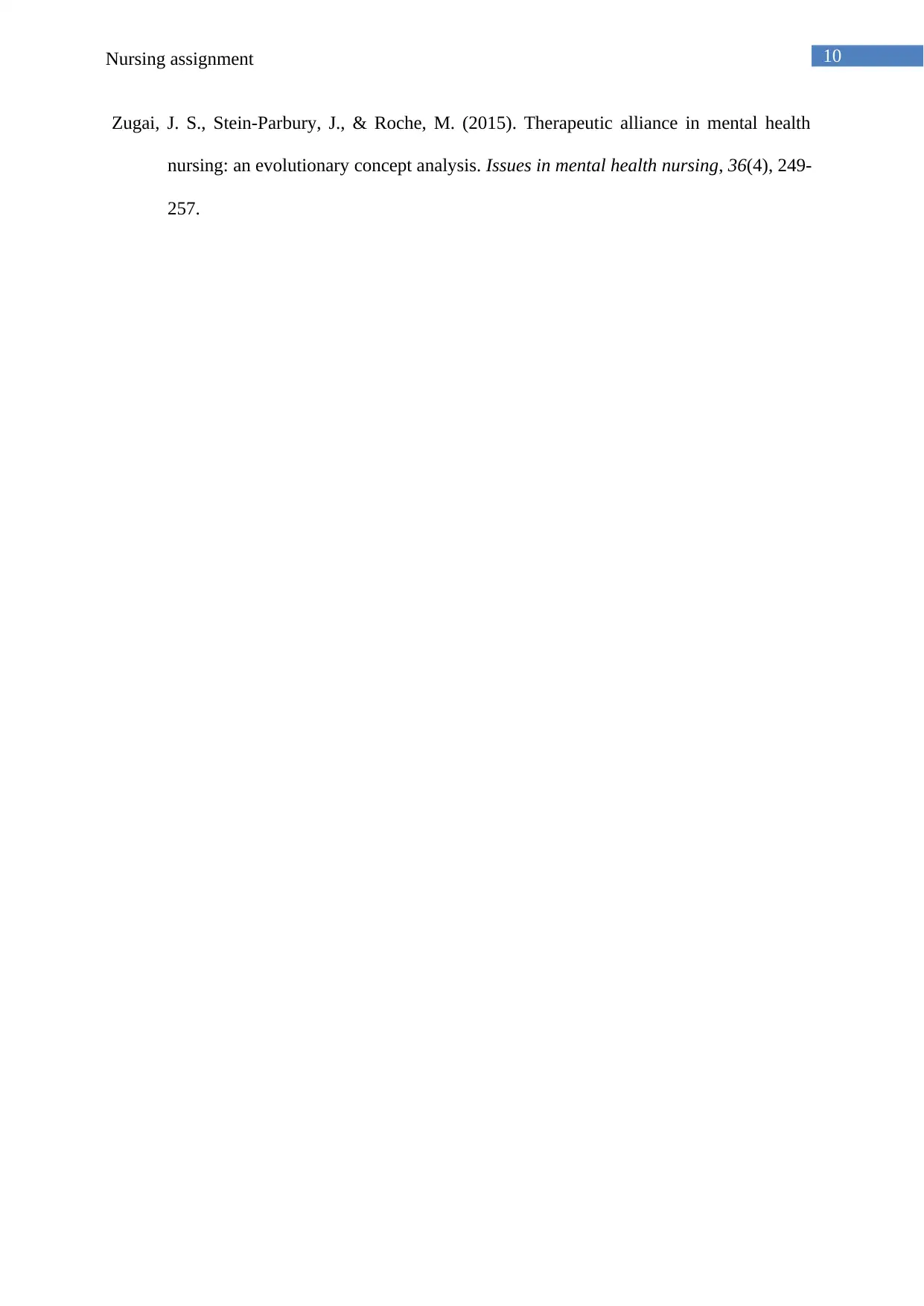
10Nursing assignment
Zugai, J. S., Stein-Parbury, J., & Roche, M. (2015). Therapeutic alliance in mental health
nursing: an evolutionary concept analysis. Issues in mental health nursing, 36(4), 249-
257.
Zugai, J. S., Stein-Parbury, J., & Roche, M. (2015). Therapeutic alliance in mental health
nursing: an evolutionary concept analysis. Issues in mental health nursing, 36(4), 249-
257.
1 out of 11
Related Documents
Your All-in-One AI-Powered Toolkit for Academic Success.
+13062052269
info@desklib.com
Available 24*7 on WhatsApp / Email
![[object Object]](/_next/static/media/star-bottom.7253800d.svg)
Unlock your academic potential
Copyright © 2020–2025 A2Z Services. All Rights Reserved. Developed and managed by ZUCOL.





